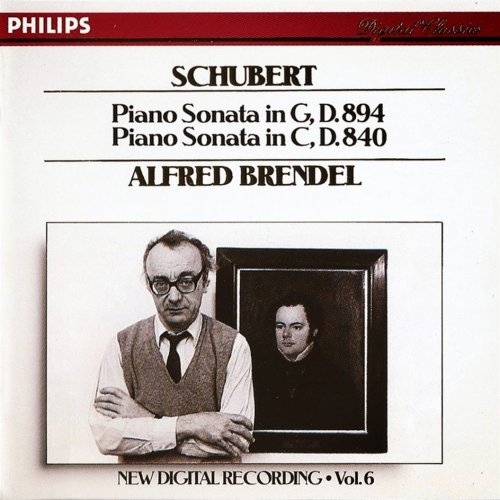
Alfred Brendel - Schubert: Piano Sonatas D.894 & D.840 (1989)
BAND/ARTIST: Alfred Brendel
- Title: Schubert: Piano Sonatas D.894 & D.840
- Year Of Release: 1989
- Label: Philips
- Genre: Classical
- Quality: FLAC (image+.cue,log,scans)
- Total Time: 01:04:45
- Total Size: 211 Mb
- WebSite: Album Preview
Tracklist:
01. Klaviersonate G-Dur Op. 78 D894 - I. Molto moderato e cantabile [0:17:22.00]
02. Klaviersonate G-Dur Op. 78 D894 - II. Andante [0:09:31.00]
03. Klaviersonate G-Dur Op. 78 D894 - III. Menuetto: Allegro moderato - Trio [0:04:51.00]
04. Klaviersonate G-Dur Op. 78 D894 - IV. Allegretto [0:09:04.00]
05. Klaviersonate C-Dur D840 'Reliquie' (unvollendet) - I. Moderato [0:11:38.00]
06. Klaviersonate C-Dur D840 'Reliquie' (unvollendet) - II. Andante [0:11:06.00]
Performers:
Alfred Brendel – piano
01. Klaviersonate G-Dur Op. 78 D894 - I. Molto moderato e cantabile [0:17:22.00]
02. Klaviersonate G-Dur Op. 78 D894 - II. Andante [0:09:31.00]
03. Klaviersonate G-Dur Op. 78 D894 - III. Menuetto: Allegro moderato - Trio [0:04:51.00]
04. Klaviersonate G-Dur Op. 78 D894 - IV. Allegretto [0:09:04.00]
05. Klaviersonate C-Dur D840 'Reliquie' (unvollendet) - I. Moderato [0:11:38.00]
06. Klaviersonate C-Dur D840 'Reliquie' (unvollendet) - II. Andante [0:11:06.00]
Performers:
Alfred Brendel – piano
From 1828 and the three posthumous sonatas Brendel has now gone back in Schubert's life to 1826 and 1825, i.e. to the G major and the unfinished C major sonatas. The G major work was not first published as a "Fantasy" for nothing: though not all that technically demanding, it is one of the most difficult to bring off in view of its leisurely, musing style and general air of benignity. Brendel never for a moment allows attention to wander. He plays it very simply and self-communingly, and somehow mesmerizes you with the raptness and radiance of it all. His lyrical tone is particularly beautiful (though just once or twice his delight in melody causes him to underplay the accompaniment). And he never allows you to remain unaware of when Schubert writes ppp rather than pp, or to miss the significance of unexpected harmonies or a key-change. Schubert himself does not specify any slowing down for the trio of the Scherzo, but Brendel certainly makes it exceptionally poetic by this means.
The C major Sonata he leaves unfinished—by that I mean he makes no attempt to rival certain colleagues who have reconstructed sketches for the last two movements. In the first movement I was struck by his very sharp contrasts of dynamics, also of tension and relaxation. For instance after launching the mysteriously subdued opening theme at around crotchet = 126, the urgency of the music's mounting strength and breadth has him playing at crotchet =144 (or thereabouts) by the bottom of the first page. The immediacy of his approach is compelling; you feel it might be Schubert at the piano actually composing the work as he played. In the slow movement Brendel's keyboard 'scoring' brought home to me as never before how easily Schubert could have conceived this work for an orchestra. The main opening theme itself is played with a pathos all the more touching for restraint. Its final return is particularly moving. All praise to the Philips engineers for the very mellow-toned recording quality. -- Joan Chissell
The C major Sonata he leaves unfinished—by that I mean he makes no attempt to rival certain colleagues who have reconstructed sketches for the last two movements. In the first movement I was struck by his very sharp contrasts of dynamics, also of tension and relaxation. For instance after launching the mysteriously subdued opening theme at around crotchet = 126, the urgency of the music's mounting strength and breadth has him playing at crotchet =144 (or thereabouts) by the bottom of the first page. The immediacy of his approach is compelling; you feel it might be Schubert at the piano actually composing the work as he played. In the slow movement Brendel's keyboard 'scoring' brought home to me as never before how easily Schubert could have conceived this work for an orchestra. The main opening theme itself is played with a pathos all the more touching for restraint. Its final return is particularly moving. All praise to the Philips engineers for the very mellow-toned recording quality. -- Joan Chissell
Classical | FLAC / APE | CD-Rip
As a ISRA.CLOUD's PREMIUM member you will have the following benefits:
- Unlimited high speed downloads
- Download directly without waiting time
- Unlimited parallel downloads
- Support for download accelerators
- No advertising
- Resume broken downloads


